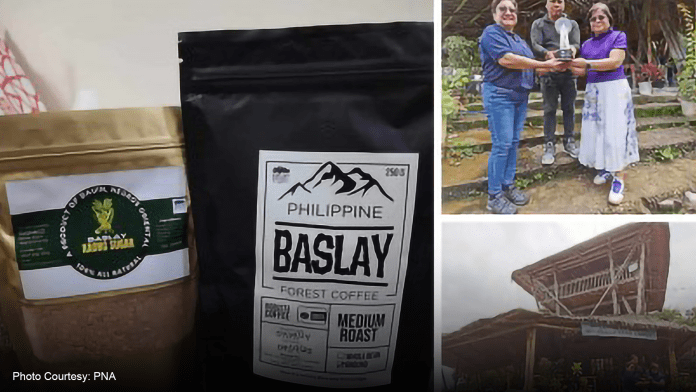DUMAGUETE CITY – The government’s One Town, One Product (OTOP) initiative transformed the Baslay Highland Agriculture Cooperative (Bashaco) in Barangay Baslay, Dauin, Negros Oriental, turning former slash-and-burn farmers into successful entrepreneurs and environmental stewards over the past two decades.
Ruel Perez, Chief Executive Officer of Bashaco, shared that their market has continued to grow since the Dauin LGU designated coffee as its OTOP.
“While coffee generally represents the town’s OTOP to ensure inclusivity among growers, Bashaco leads the way through our technological advancements, which allowed us to be the first to excel in producing quality coffee,” Perez explained.
Under the leadership of Mayor Galicano Truita, the Dauin LGU passed an ordinance in 2023 officially recognizing coffee as the town’s OTOP, even before the Senate mandated LGUs to develop products that reflect their unique identities, according to Perez.
A Journey of Learning
In 1989, local farmers who were using the destructive “kaingin” method of clearing land were organized into the Baslay Coffee Association under the guidance of the Department of Labor and Employment (DOLE). Initially, the association focused on planting and harvesting coffee, selling beans for as little as PHP60 per kilo, with their rudimentary methods yielding inconsistent results.
“It took us 25 years to move away from old habits, as we were initially operating on a hit-and-miss basis. As is often the case, Filipinos tend to embrace proper methods only after seeing the benefits,” Perez said.
Through a series of interventions by government and non-government organizations, the farmers gradually transitioned from traditional to modern practices in growing, harvesting, and processing coffee. This journey culminated in the establishment of Bashaco as a cooperative on November 17, 2020.
Prior to the formation of the cooperative, the Energy Development Corporation (EDC) organized the ‘kaingeros’ in 1984, engaging them in its BINHI reforestation program. EDC provided financial and technical support, helping the Baslay farmers become self-sufficient while protecting the watersheds around the Mt. Talinis area, where the company’s geothermal power plants are located.
EDC’s efforts were recently recognized with international sustainability awards for its Corporate Social Responsibility coffee project in Baslay, including the Outstanding Social Empowerment Award from the Asia Responsible Enterprise Awards, which EDC officials presented to Perez.
Expanding Horizons
After years of hard work, the Baslay coffee growers have expanded their product offerings to include cacao tablea, forest honey, and arenga sugar, all sourced from the 487 hectares of forest land managed by the cooperative. Of this land, 120 hectares are dedicated to coffee cultivation, including Robusta, Arabica, and Liberica varieties, with the remaining land used for other greening projects.
“Thanks to our commitment to quality, Bashaco can now command higher prices for our products, which are regularly audited by the Department of Trade and Industry (DTI),” Perez said.
Investing in the Future
Looking ahead, Perez envisions a future where the younger generation, particularly the children of cooperative members, will carry forward the legacy of coffee farming. To support this vision, Bashaco has established its own Highland Brew Coffee Shop in Dauin, which also serves meals, hosts small events, and operates a cooperative store.
In a gesture of paying it forward, the cooperative pays its harvesters PHP35 per kilo of coffee harvested, significantly higher than the PHP18 to PHP22 per kilo paid by other coffee farms in the country. All harvesters are cooperative members, and the cooperative’s mission is to uplift their lives.
Today, Bashaco produces Grade 1 specialty coffee, as evaluated by the DTI, which sells for as much as PHP1,280 per kilo, far surpassing the PHP300 per kilo price of mainstream retail coffee.
The cooperative also involves 20 young people, children of its members, in part-time work as restaurant servers, with many already trained in coffee production. Some of these young individuals are now considering pursuing agriculture courses.
Perez emphasized the potential of coffee and cacao production, both billion-dollar industries, to provide lucrative opportunities for farmers. With President Ferdinand Marcos Jr. identifying these as high-value crops for the country, Perez hopes more farmers will venture into these areas to meet industry demands.
He expressed hope that one day, the Philippines, currently one of the world’s largest importers of coffee, will shift from an import-dependent nation to a leading producer.
“If you’re a coffee farmer, don’t stop there. We need to grow, harvest, process, brew, and market our coffee to truly capture the entire value chain,” Perez concluded.

